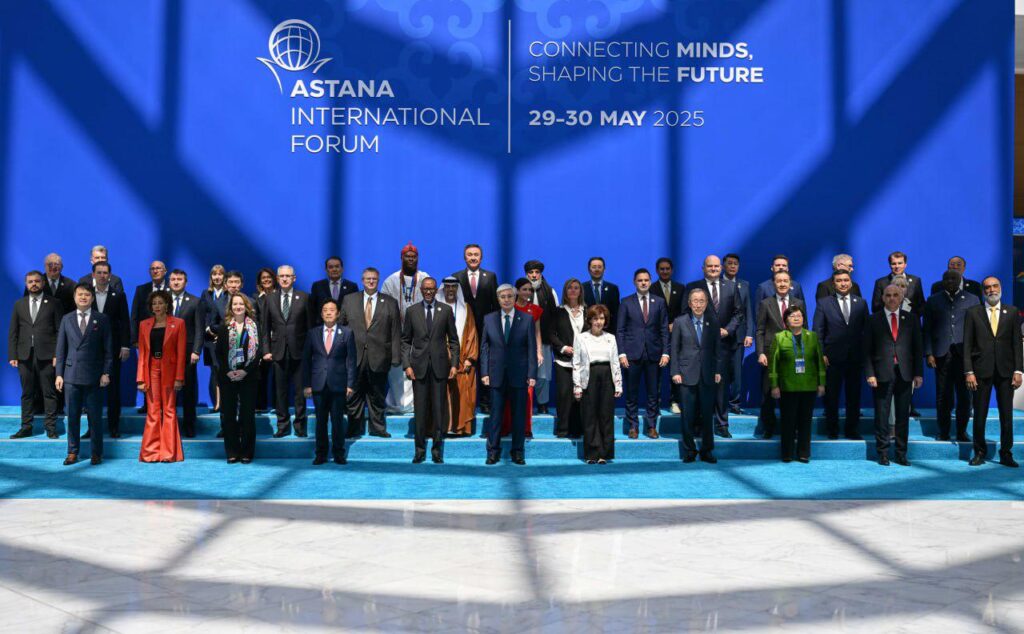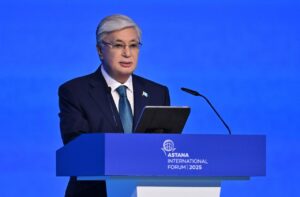Astana International Forum: Emergence of a Middle Power

By Aditi Bhaduri
Is the Republic of Kazakhstan emergency as a future pole in a multipolar world? After all, the country seems to tick all the right boxes.
Attending the Astana International Forum 2025 was a journey of discovering Central Asia ‘s largest country, and what it has to offer the world.
The Central Asian region itself is a much overlooked and under-studied region. In recent times it has made more news as a salubrious and low budget getaway for the increasing number of Indian tourists. But this region, occupying 4,003,451 sq.km., with a population of 75 million, is a resource rich one, possessing oil, gas, metals like gold, silver, aluminium, bauxite, copper etc. Five per cent of the worlds natural gas reserves are to be found here. Landlocked, it occupies, a major geo-politically strategic position, extending from the Caspian Sea in the west to the border of western China in the east. It is bounded on the north by Russia and on the south by Iran, Afghanistan, and China. In 2024 the combined GDP of five Central Asian nations surpassed $500 billion.

Of these, Kazakhstan stands out as the largest country in the region, and ninth largest in the world, with a 20+ million population. Rich in hydrocarbons, Kazakhstan is a major supplier of energy to Europe and China. The country is also rich in rare earth minerals which is the most covetted product in the world today. Kazakhstan produces 19 out of 34 types of raw materials, including uranium, titanium, copper, lithium, cobalt, tungsten and many others. It is the largest producer of uranium in the world, and the largest supplier of uranium to India. Yet, with two major nuclear testing sites on its territory,
Kazakhstan voluntarily gave up its nuclear weapons arsenal and is dedicated to disarmament.
The world is undergoing a major geopolitical and geo-economic flux. There are two wars underway in the world, both in the Eurasian region, and we had our own Operation Sindoor last month. Global trade is being remade by unilateral measures of some powers. The multilateral world order is fragmenting with more countries taking unilateral measures. Here Central Asia as a whole, and Kazakhstan in particular has a stabilizing role to play. Peace, security and development of this region is very conducive for larger security and development of the world.
Kazakhstan ‘s foreign policy is rooted in the protection of sovereignty and territorial integrity of its state, and promotion of dialogue and diplomacy over conflict. Kazakhstan supports the model of a multipolar world, a system in which independent states interact on the basis of international law, and not under the pressure of globalist ideas, adhering to the concept of “state nationalism” – a desire of countries to preserve their ethno-cultural identity and preserve sovereignty.
Indeed, the Astana International Forum showcased Kazakhstan’s adherence to a multipolar world order, as dignitaries from Europe, like Prime Minister Georgia Melloni of Italy to Africa, like Paul Kagame, President of Rwanda, graced the forum, as did representativesof a host of UN and other multilateral organisations like the Eurasian Development Bank.
Under the motto “Connecting Minds, Shaping the Future” the Astana International Forum (AIF), held from May 29-30, brought together about 600 foreign guests from more than 70 countries – from heads of states to the heads of UN structures, global business leaders and influential experts. Over two days, 25 expert sessions were held, covering a wide range of topics, including: international cooperation, security, climate agenda, energy, water resources. The main mandate of the AIF was the revival of multilateralism, based on mechanisms that allow each state to enjoy privileges in relations with all partners.
The key theses of the forum was that the world as we currently know it is in a state of polarization and growing violence. However, the age of Artificial Intelligence and challenges is incompatible with the logic of old wars and protectionism. The main message of the forum, as President Kassym-Jomart Tokayev outlined, was that middle powers like Kazakhstan, have a role to play in ensuring a more equitable and just world. Kazakhstan can claim the status of a Middle Power due to its geostrategic position, situated between China and Russia with whom it shares the longest land border on the world, vast territory, active foreign policy, promotion of international initiatives, striving for a balance of interests with all key players in world politics.
Keeping with its principle of privileging dialogue and diplomacy Kazakhstan has positioned itself as a peacemaker, hosting, for instance, several dialogues over Syria, known as the “Astana Process”. A Muslim majority country, it upholds pluralism, tolerance, the rule of law, and women’s rights. Seeking to advance dialogue amongst faiths, it launched “The Congress of Leaders of World and Traditional Religions” initiative of which India is also a member.
Alongside its international profile and initiatives, Kazakhstan has been making rapid development inside the country in infrastructure, logistics, digitalization, innovation, information technology, transparency and the rule of law, and facilitating the ease of doing business. For instance, Kazakhstan created the International Advisory Council on Artificial Intelligence earlier this year. It has established the Astana International Financial Centre for the easier facilitation of investments and financial operations. Kazakhstan attracted $15.7 billion in foreign direct investment for new projects in 2024, marking an 88 percent increase compared to the previous year!
While the Caspian Pipeline Consortium (CPC) remains the main modal for the transportation of Kazakh energy exports to the US, it is also developing alternative routes for transporting goods and cmmodities. Kazakhstan is implementing projects in the field of renewable energy and environmentally friendly fuel, increasing wind and solar energy capacities, and also developing projects for the production of green hydrogen.
To cap it all, agriculturally, the country has marched ahead, achieving a record harvest of nearly 27 million tons of grain – the highest in the past decade. According to experts Kazakhstan is the region’s bread basket and may well turn out to be the world’s as it has the potential to feed a billion people!
All this not only enhances Kazakhstan’s appeal and importance but makes it a longterm strategic partner that any country would like to hav